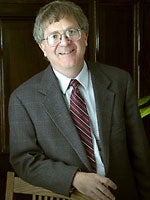Giving the biennial Vaughan Lecture at Harvard Law School, former federal appeals court judge Michael McConnell contemplated the question “What would Hamilton do?,” examining the role of Alexander Hamilton’s vision for the United States in today’s political landscape.
McConnell, a distinguished scholar who held numerous academic posts before serving as a judge on the U.S. Court of Appeals for the Tenth Circuit until 2010, is a former visiting professor at Harvard Law School. He is now on the faculty at Stanford Law School, where he is director of the Stanford Constitutional Law Center.
In her introductory remarks before the lecture, Harvard Law School Dean Martha Minow said of McConnell: “His landmark articles—meticulous reconstruction of the original understanding of the 14th Amendment, imaginative and powerful explorations of religious freedom and establishment, thoughtful treatments of judicial reasoning and humility, his attention to the discriminatory effect of case law—showed the courts how to recast treatment of religion in schools and government programs.”
“A sterling appellate advocate, he has argued 12 cases in the Supreme Court, successfully renovating constitutional case law; and when President George W. Bush nominated Michael McConnell to serve on the United States Court of Appeals for the 10th Circuit, lawyers and law professors around the country cheered; 300 law professors across political and disciplinary views joined in support. He promptly and rightly secured a reputation as one of the finest and most influential judges in the country.”
In his lecture, McConnell observed that neither political party wishes to take ownership of Hamilton’s legacy today; Democrats routinely honor Jefferson and Jackson, and the Federalist Society favors Madison.
“For all his brilliance and influence on the founding, Hamilton is kind of an odd man out on the ideological divides of today,” McConnell said. “Hamilton is not exactly a man of our season. Neither the Tea Partiers nor the Obama Democrats are likely to hold onto his example. But maybe that makes him all the more rewarding.”
“You have to be dazzled by his life,” McConnell told the audience. “No prominent American statesman rose so quickly from so little who excelled so splendidly in so many things.”
In the context of the current health care litigation, McConnell said, Madison, Jefferson, and Randolph would likely take an even narrower view of the Necessary and Proper clause of the Constitution than do the opponents of the health care bill, and that Hamilton would take a less constrained view of how to define federal power than is held by even the proponents of the Obama healthcare legislation.
“Hamilton took a very broad view of the means the federal government can exercise in service of its enumerated ends. But Hamilton did not take a particularly expansive view of what ends have been entrusted with the federal government.”
In Federalist 17, for example, Hamilton explains that commerce, finance, negotiation, and war should be the chief concerns of the national government, McConnell observed.
Hamilton believed “that the national government should deal with a small number of important matters and do them well,” he said.
“To dabble in mundane matters of domestic policy would be distracting and beneath [the national government],” Hamilton wrote.
“That might possibly be good advice,” McConnell concluded.
The Vaughan Lectureship was established in 2008 by Wiley Vaughan of the Harvard Law School Class of 1948. Mr. Vaughan, now retired, was a partner at Hale and Dorr (now WilmerHale) in Boston for 47 years, including a period as co-managing partner of the firm.
When he established the Vaughan Lectureship, he said: “I have endowed this lecture at Harvard Law School to promote and advance understanding of the founding principles and core doctrines of American constitutionalism. … In my judgment, the Constitution of the United States is the greatest practical achievement of political science. It is a testament to the extraordinary gifts of creativity, prudence, and high mindedness possessed by the founders of our Nation. May you be guided and inspired by their genius as you meet the challenges of the present day.”
